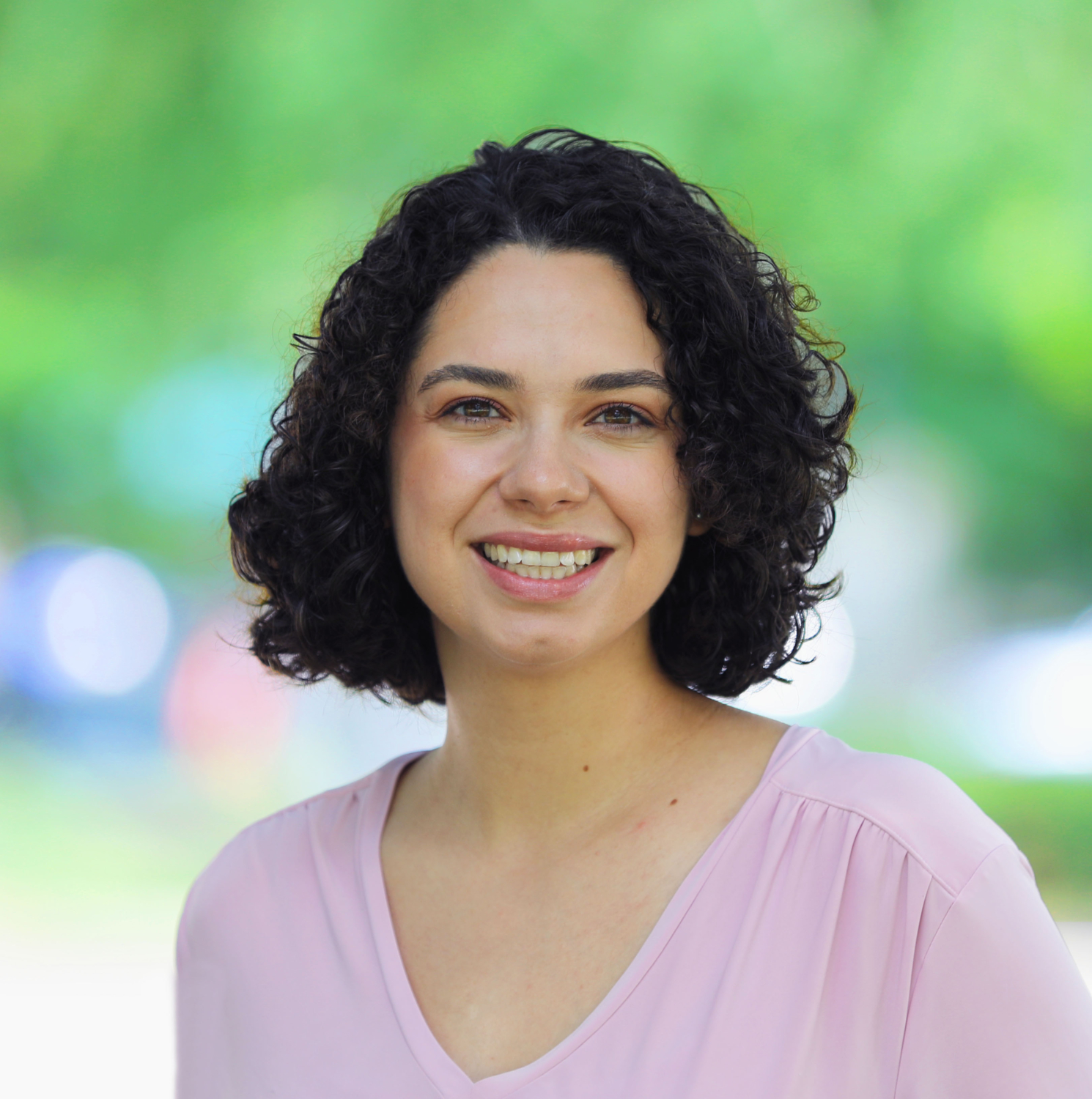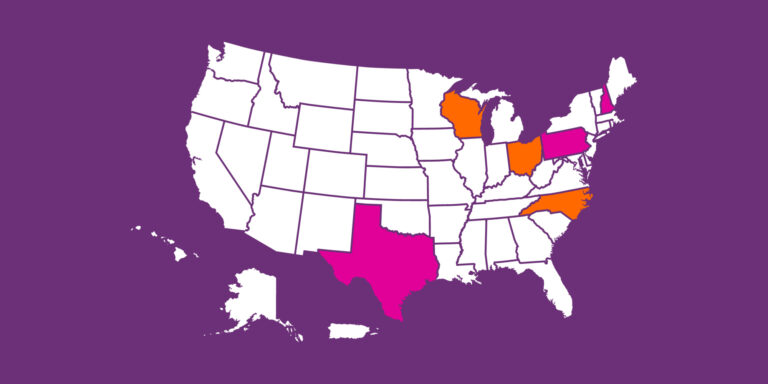Defending Educational Choice One Case at a Time: Leslie Hiner’s Inspiring Journey
Growing up in Canton, Ohio, Leslie Hiner remembers being inspired by the Perry Mason television series – a show about a criminal defense attorney handling the most difficult cases.
“I was inspired by Perry Mason. I loved Perry Mason,” she said. But it was a Rotary exchange student experience in Sweden during her junior year of high school that ignited her passion for international relations.
“I studied and did research at the United Nations (UN) in Geneva during college and kind of fell in love with that whole international scene. The research was just great. And I planned to get my graduate degree at the Graduate Institute of International Studies,” she recalled.
However, after college, Leslie faced serious health issues that required two surgeries and a year-long recovery. “I had to stay close to my parents, and doing nothing for a year just wasn’t an option,” Leslie said.
While recovering, she searched for the best academic program nearby and found a law school. Despite being very sick and in a lot of pain, Leslie made it through the first year, while many of her classmates did not.
“If I could get through law school while in pain, I figured I could handle anything,” she said. “So, I talked to the professors and lawyers over in Geneva that I was working with, and they said, I might as well finish it and then come over.”
During law school, Leslie married and moved to Indianapolis, however, in Indiana she struggled to find work in international law. Instead, she joined a small law firm, taking on every case that came her way. Leslie pursued this path as a way to establish her credentials quickly as a practicing attorney and to understand the fundamental impact of the law on the lives of every citizen.
“One of my early cases involved a school choice issue. A pair of divorced parents disagreed to where their daughter should be educated. The father wanted his daughter to attend public school while the mother wanted her to attend private school because her daughter was excelling at the school, and it was a better fit. The question was, who should decide how and where a child is educated?”
“We had a five-day trial, and I had to learn a lot about private schools and homeschooling, really digging into who should make these decisions,” she said. “It was a big deal because I didn’t know anybody who did go to private schools except for some people I met in college. So that was my crash course in learning all about private schools and homeschooling.”
This case, which should have been straightforward, turned into a significant trial which was a case of first impression for the court. The turning point came when the judge ruled in favor of Leslie’s client.
“The judge rendered his decision at 3:30 in the afternoon, and we won,” Leslie said. “That night, I saw a news story about kids getting into a shooting at the school my client’s daughter would have attended if we had lost. That moment rocked my world. In that moment, I realized my client was right about everything she told me.”
Leslie then clearly understood that the mother, not the government, was in the best position to know what was best for her daughter.
Leslie and her husband purchased a business in Kokomo, Indiana which prompted them to move from Indianapolis. Her business involvement led her to join the Chamber of Commerce’s Legislative Affairs Committee where she advocated for parental freedom of choice in education, and took this view to the state chamber and state legislators. Finding interest in there, she connected with Pat Rooney, the founder of the Choice Charitable Trust and started to get more involved in supporting the trust through legislative affairs.
After four years, Leslie’s family moved back to Indianapolis where Leslie worked as counsel for the Pat Rooney, finding allies among new legislators passionate about educational choice.
“We clicked instantly,” she said. “I started working on this in both my professional and personal capacities. One of my jobs was to make sure that this Choice Charitable Trust program was working right. So I went to the schools, I talked to the kids, the parents, the teachers, and really got deep into this work,” she said.
In 1996, two pivotal actions occurred that energized the prior work of school choice advocates and solidified a more directed approach. The Milton and Rose Friedman Foundation for Educational Choice was created, and hired Robert Enlow, who would become president and CEO in 2009. Also, advocates convened a formal meeting to plan future goals for attaining school choice in Indiana. Robert and Leslie met at this meeting, and continued working together on school choice in Indiana.
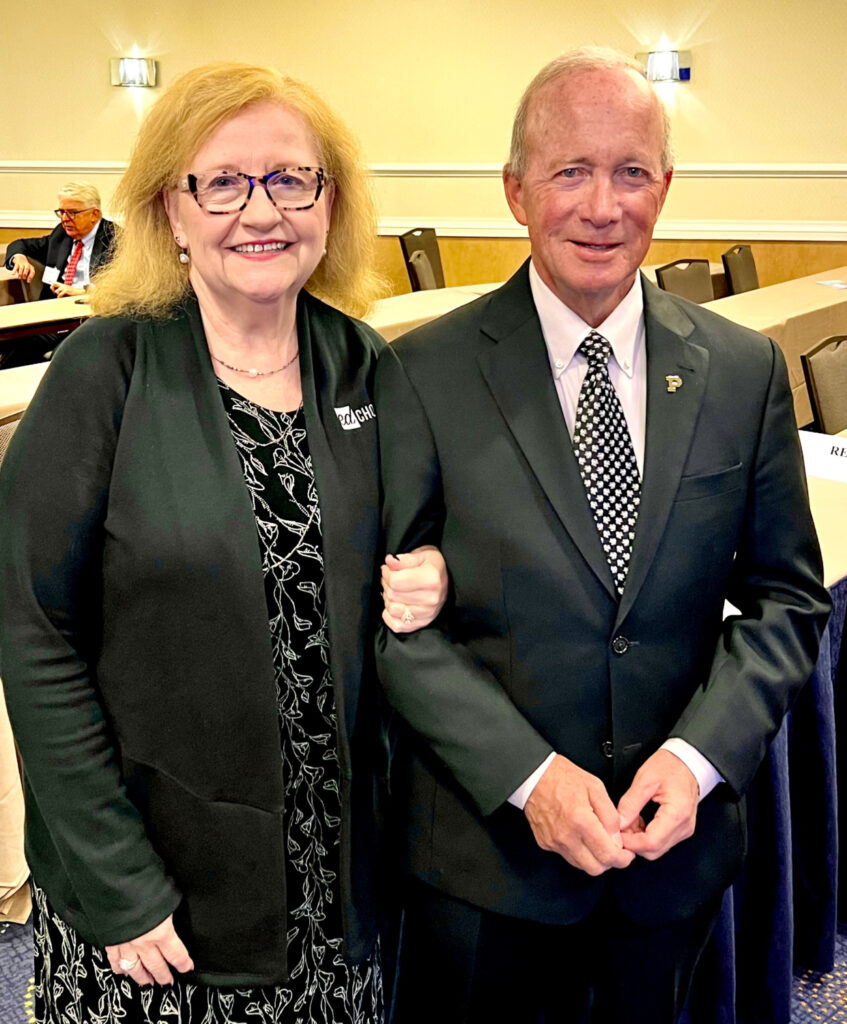
Leslie Hiner (left) stands alongside Mitch Daniels, Fmr. Governor of Indiana (2005-2013).
In 2002, Leslie had first reached out to Institute of Justice (IJ) regarding case strategy for the Cleveland voucher case, Zelman vs. Simmons-Harris. From then on Leslie frequently worked with the Institute for Justice, offering input on multiple aspects of school choice litigation.
After working in the private practice of law, then serving as chief of staff to the Speaker of the House, in 2008, Robert asked Leslie to join Friedman (EdChoice).
“I never believed in staying too long at the legislature. There should be turnover after a certain amount of time. When I received Robert’s offer, I thought to myself ‘where else would I go?’ The normal path would have been for me to go with one of the big law firms, but I was talking to people at the big law firms and the conversations didn’t sit well with me, even though I really liked the people. I had the unsettling feeling that I would be missing something.”
“I just kept thinking that if I would do that, I would be missing something that was important to me. And so, when the opportunity then came to go to Friedman, I realized that’s the thing I would be missing. I’ve been a crusader for education choice for all these years. I wasn’t willing to give it up for any reason.”
After Leslie announced to her colleagues that she would be leaving the legislature, she was elated by their reactions.
“Everybody said, ‘Well, of course she’d go there. Where else would she go? Of course, because you know that she’s passionate about this.’ And I knew I made the right decision.”
“I was not willing then, and I’m not willing now, to turn my back on those families and children whose lives depend on being able to access educational resources other than the schooling provided by government. Parents have thanked me for, in some cases literally, saving their children’s lives, and students have thanked me for saving them from bullying, depression, and lives forever in poverty. That’s powerful. And the need is great.”
Leslie joined as Director of Programs, where she guided the Friedman state team to advance school choice in numerous states, including to pass Indiana’s first tax credit scholarship. In 2009, the state passed a law that allows individuals and corporations to claim up to a 50% state tax credit for gifts they voluntarily make to another nonprofit that gives out scholarships. Since the Educational Choice Charitable Trust was already established, all the kids in that program automatically qualified for the new scholarships.
One of Leslie’s most significant involvements was in Montana, where successful work to adopt school choice would ultimately lead to litigation that opened the door to adoption of school choice opportunities across the nation.
In 2008, Jeff Laszloffy of the Montana Family Foundation called EdChoice (then the Friedman Foundation for Educational Choice) and asked for help educating policymakers and education advocates in Montana about school choice.
After years of dedication by local advocates, and unwavering leadership from Laszloffy, Montana finally passed a tax credit scholarship program in 2015. Litigation to block that program began after the state Department of Revenue imposed regulations on the program that prohibited parents from accessing private schools for their children – if those schools were religious.
School choice advocates went on offense. Attorneys at the Institute for Justice (IJ) brought litigation, as they had experience for many years representing parents as intervenors in school choice cases. Montana’s school choice case was Espinoza vs. Montana Department of Revenue.
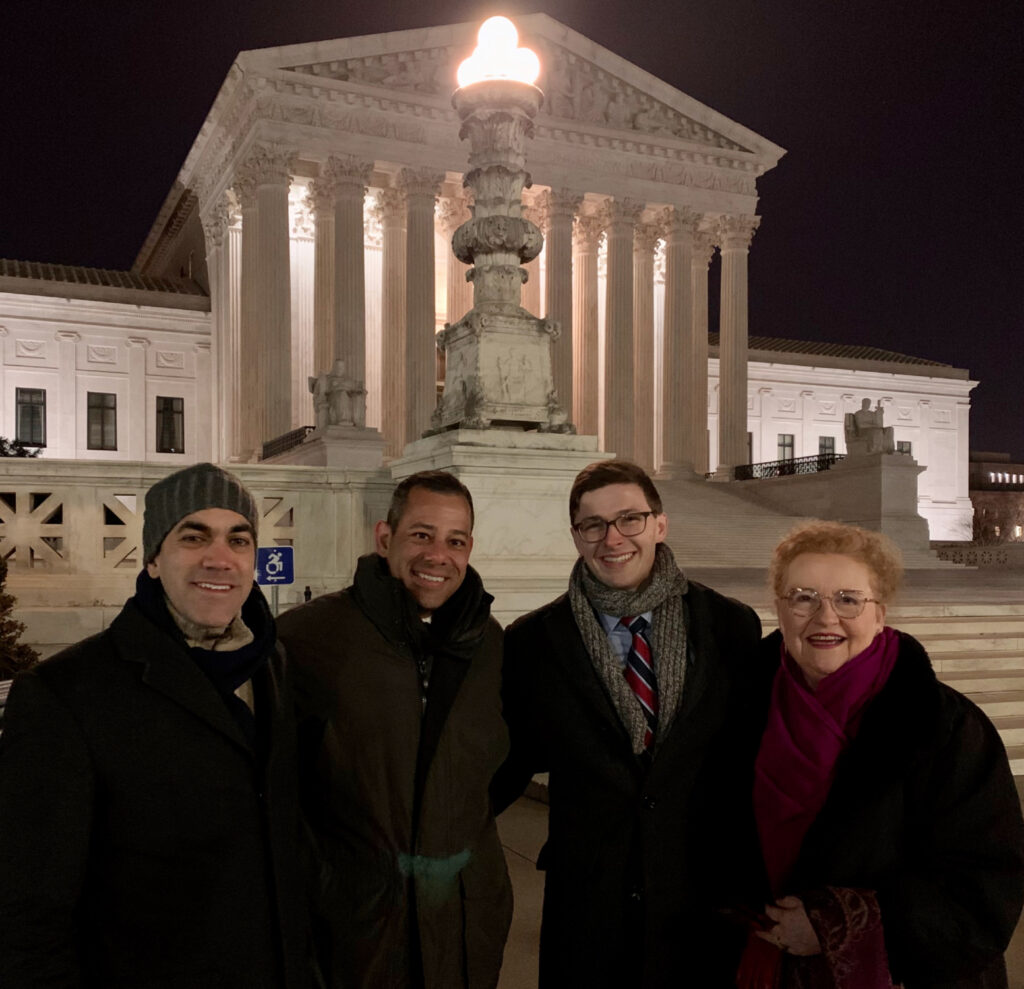
Leslie Hiner (right) and colleagues stand in front of the Supreme Court of the United States the morning of oral arguments in the Espinoza case.
“The Espinoza case was really near and dear to my heart,” she said. “We had to be on offense. Kendra Espinoza’s daughters were directly impacted by the regulations,” Leslie said. “This was deeply personal to Kendra and her daughters. At the Montana Supreme Court for oral arguments, I asked Kendra if she was okay. She put her hands out, and they were shaking. But she said, ‘We couldn’t do anything else. I wouldn’t be anyplace else.’”
Leslie provided legal support by educating Montana parents and legislators about legal mechanisms and implications, and by offering support to IJ including filing several amicus briefs on behalf of Friedman (EdChoice). The Espinoza case eventually reached the U.S. Supreme Court.
“It was clear that this wasn’t just about Montana anymore,” she said. “This case had the potential to impact school choice across the entire country. The night before the arguments at the U.S. Supreme Court, I couldn’t sleep,” she said. “I kept thinking about all the families depending on us.”
When the Supreme Court ruled in favor of Espinoza, it was a monumental victory. “We won in a really big way,” Leslie said. “Montana realized this case would help other states too. They were so moved.”
Recognizing the increasing complexity and intensity of legal challenges, Leslie helped establish the Legal Defense and Education Center (LDEC) to provide dedicated support for school choice litigation. “We needed a dedicated effort,” she said. “The opposition was big-time.”
Formally established in 2018, the Legal Defense and Education Center (LDEC) built on EdChoice’s history of providing legal expertise to policymakers, media outlets and the legal community. LDEC works in partnership with state and national allies to identify and remove legal barriers to universal school choice and provide ongoing legal assistance to the school choice movement.
LDEC has become a vital resource for defending educational choice initiatives. “Having a specialized team makes a huge difference,” Leslie said. “It’s not about winning cases; it’s about giving families the freedom to choose the best educational path for their children.”
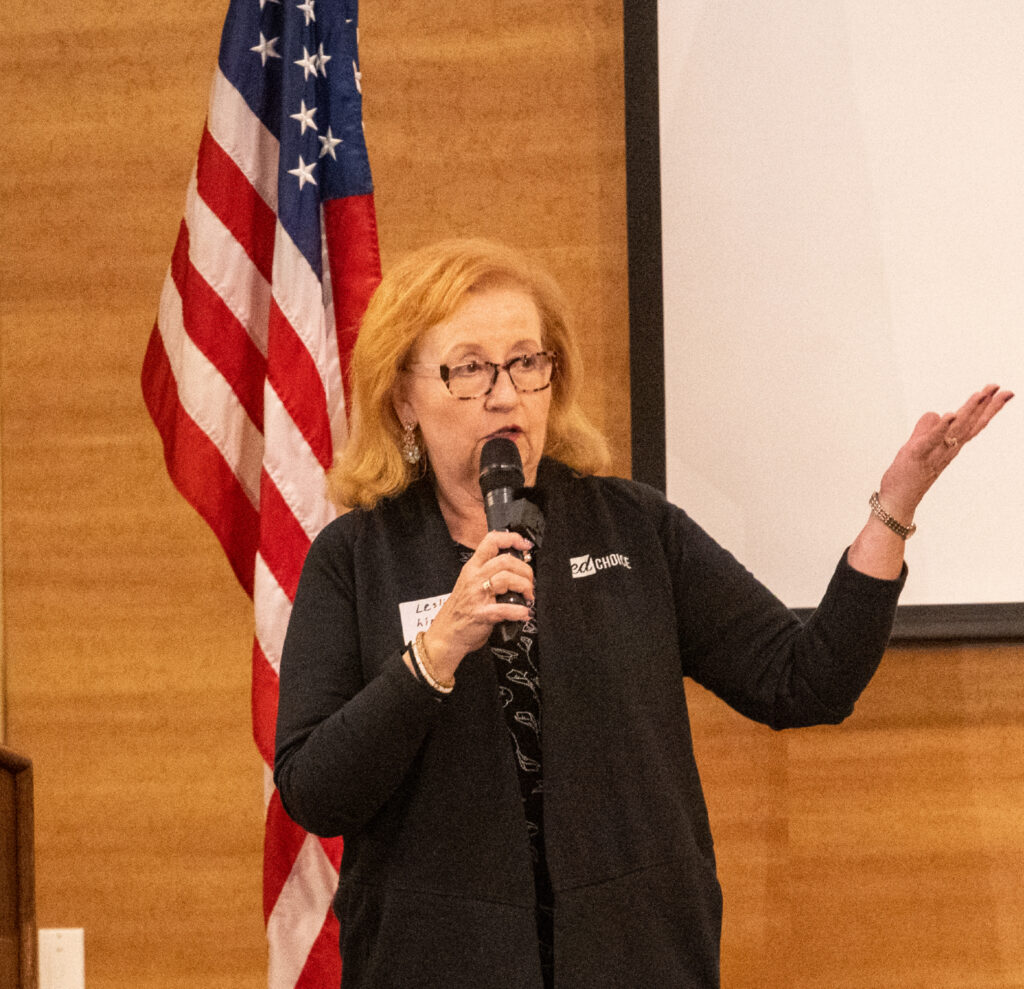
Leslie Hiner gives a presentation on behalf of EdChoice.
With the addition of EdChoice Legal Advocates (EdLA), LDEC is transitioning to LPEC, the Legal Policy and Education Center. Leslie’s work previously included managing or drafting briefs in support of school choice programs for submission to state and federal courts, and the U.S. Supreme Court. Going forward, EdLA will submit amicus briefs and Leslie will provide input based on her considerable years of experience with school choice and its litigation. EdLA will also assume legal defense duties to protect new and long-established programs when they are challenged in court.
Leslie will continue to support our work on legal policy and legislative development in various states, while also writing and speaking publicly about school choice whenever possible. She will continue to share our message of freedom with parents both domestically and internationally, advocating for their right to choose the best education for their children.
“There’s always more work to be done,” she said. “Every victory is just a step towards greater educational freedom. Every case, every battle, every late night—it’s all worth it when you see the relief and hope in the eyes of parents and children. That’s what keeps me going.”


